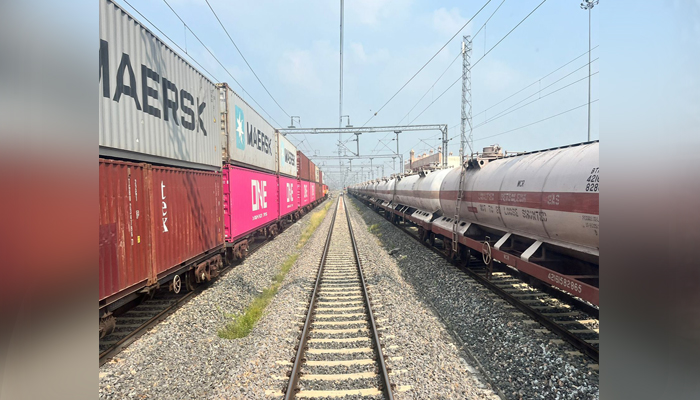New Delhi, Akash Dwivedi: The Dedicated Freight Corridor (DFC), built to reduce the cost of freight and make the transport system more efficient, has started demonstrating its potential. A freight train is passing every 12 minutes on this 2843 km long corridor, and by next year this number will increase to 480 freight trains per day.
This transformation will accelerate the goal of the Government of India, in which an effort is being made to bring the logistics cost to a single digit. During a rail journey from New Dadri to New Phulera on the Western Corridor of DFC, members of the media were informed about the progress of DFC. On this occasion, Deputy General Manager (Corporate Communication) of DFC, Chitresh Joshi said that 97 percent of the project of the Eastern and Western Corridor has been completed and currently 350 freight trains are being successfully operated on it every day.
Out of the 2843 km long DFC, 2741 km of track has already been completed. A 103 km track is under construction between Mumbai and Baitarna, which is expected to be completed by next year. After this, the DFC will be ready to operate 480 freight trains per day at full capacity. With the help of DFC, about 20 percent of the total freight of Indian Railways will be through the corridor, whereas at present this figure is about 10 percent. After the project is fully operational, there will be a big jump in the freight capacity and efficiency of Indian Railways.
Most importantly, through DFC, freight trains will be able to reach their destination directly without any hindrance, saving time and resources. The use of this corridor will become more effective when it is fully connected to JNPT (Jawaharlal Nehru Port Trust) and other major ports, providing a smooth route for international trade as well.
DFC will prove to be a game changer in key areas such as the transportation of large volumes of goods through double stack containers, milk tankers, e-commerce products and faster supply of perishable goods. Being able to deliver these goods faster and over longer distances will save both time and cost to traders and consumers. DFC will play a decisive role in expanding trade and making the supply chain more efficient.
One of the biggest features of DFC is its ability to bring logistics costs down to single digits. Currently, logistics costs in India are around 13 to 14 percent of the total GDP, while in the US and China it is between 8 to 9 percent. Once DFC becomes fully functional, India’s logistics costs will also come down significantly, enabling it to emerge more strongly in global competition. The reduction in logistics costs will not only benefit entrepreneurs, but its impact will also reach consumers, as the cost of goods will be reduced and their supply will be ensured on time.
The DFC network passes through major industrial states like Uttar Pradesh, Bihar, Haryana, Rajasthan, Maharashtra, and Gujarat, due to which this corridor will directly benefit the economy and industrial activities of these states. Industries located in these states will get a big benefit from DFC to increase their productivity and faster and cheaper transportation of goods. Apart from this, its effect will also be seen in other parts of the country, as it will further strengthen the speed of supply chain in different parts of the country.
Along with this, after the construction of DFC, more than 15 percent of the railway lines of Indian Railways have become free from the burden of freight trains. Passenger trains will get direct benefit from this, as the number of passenger trains and their timetable will also improve. Improvement in passenger services of railways will give a better travel experience to the general public and will also increase the revenue of Indian Railways. DFC is not only revolutionizing the field of freight transportation, but it is also having a positive impact on the passenger services and overall rail network of Indian Railways.
